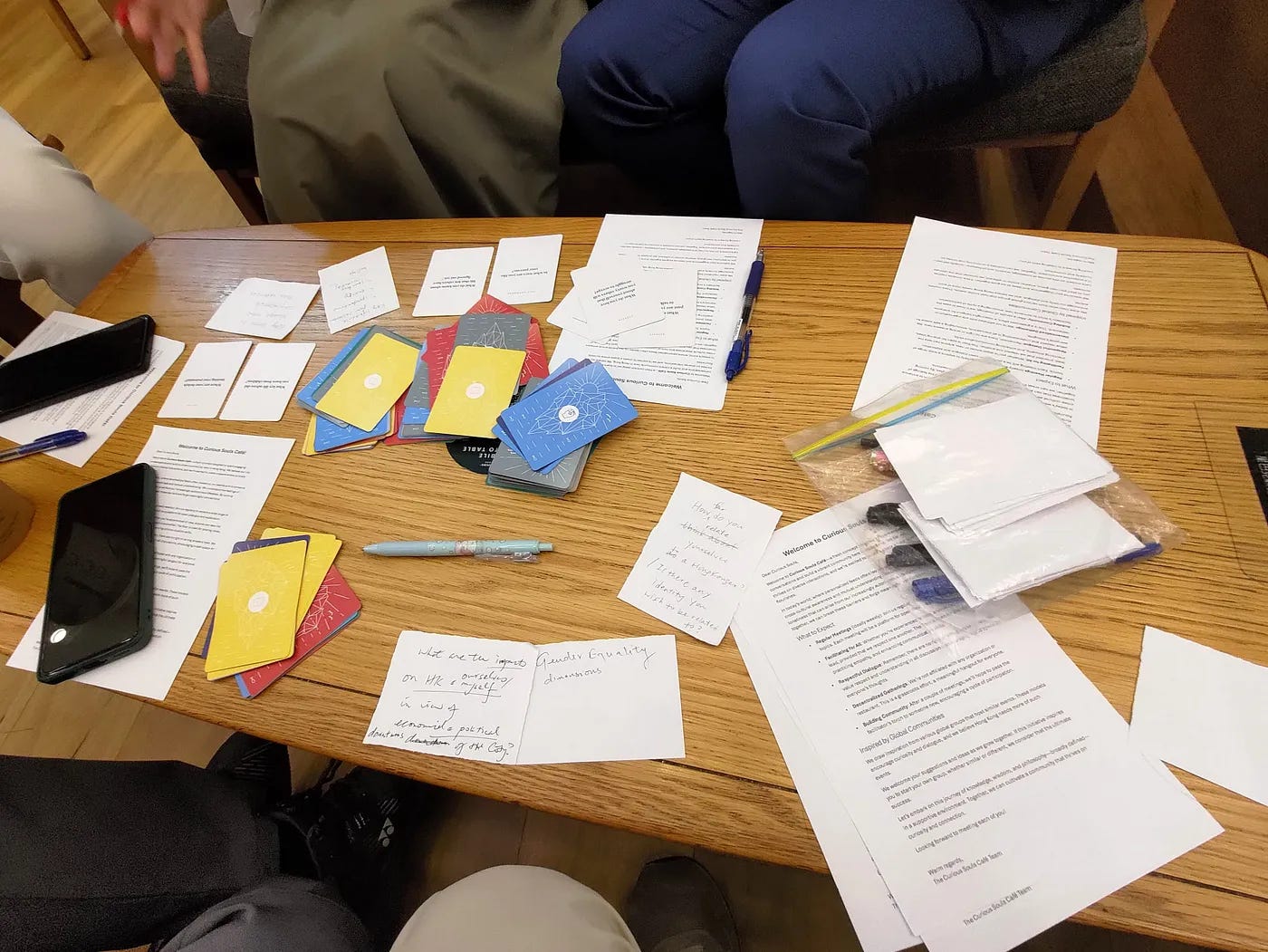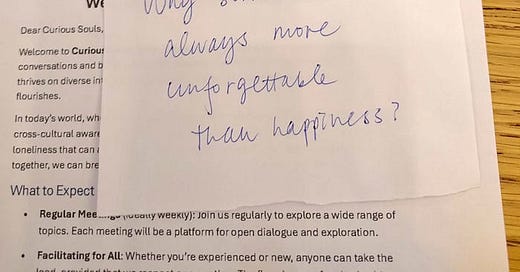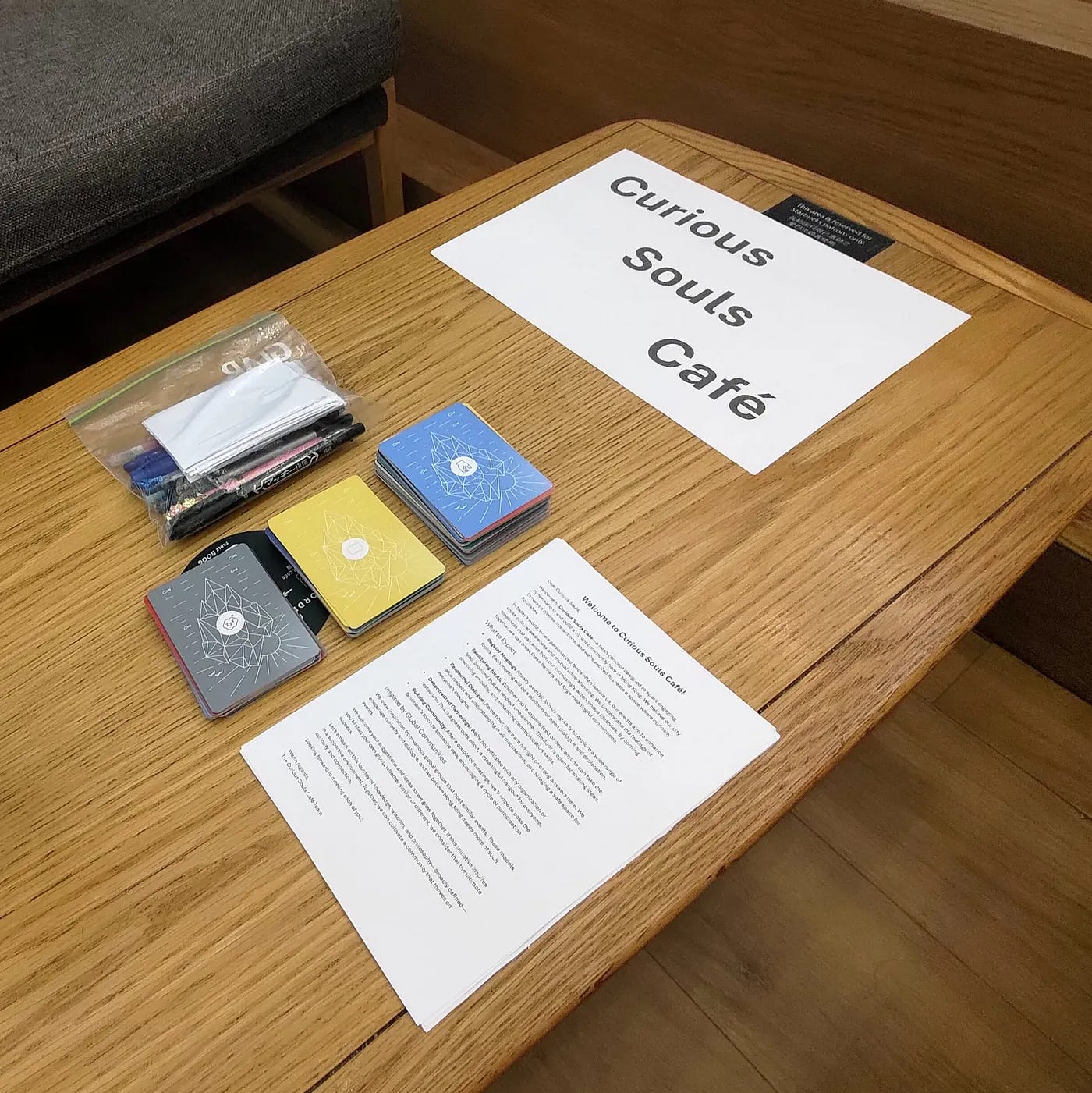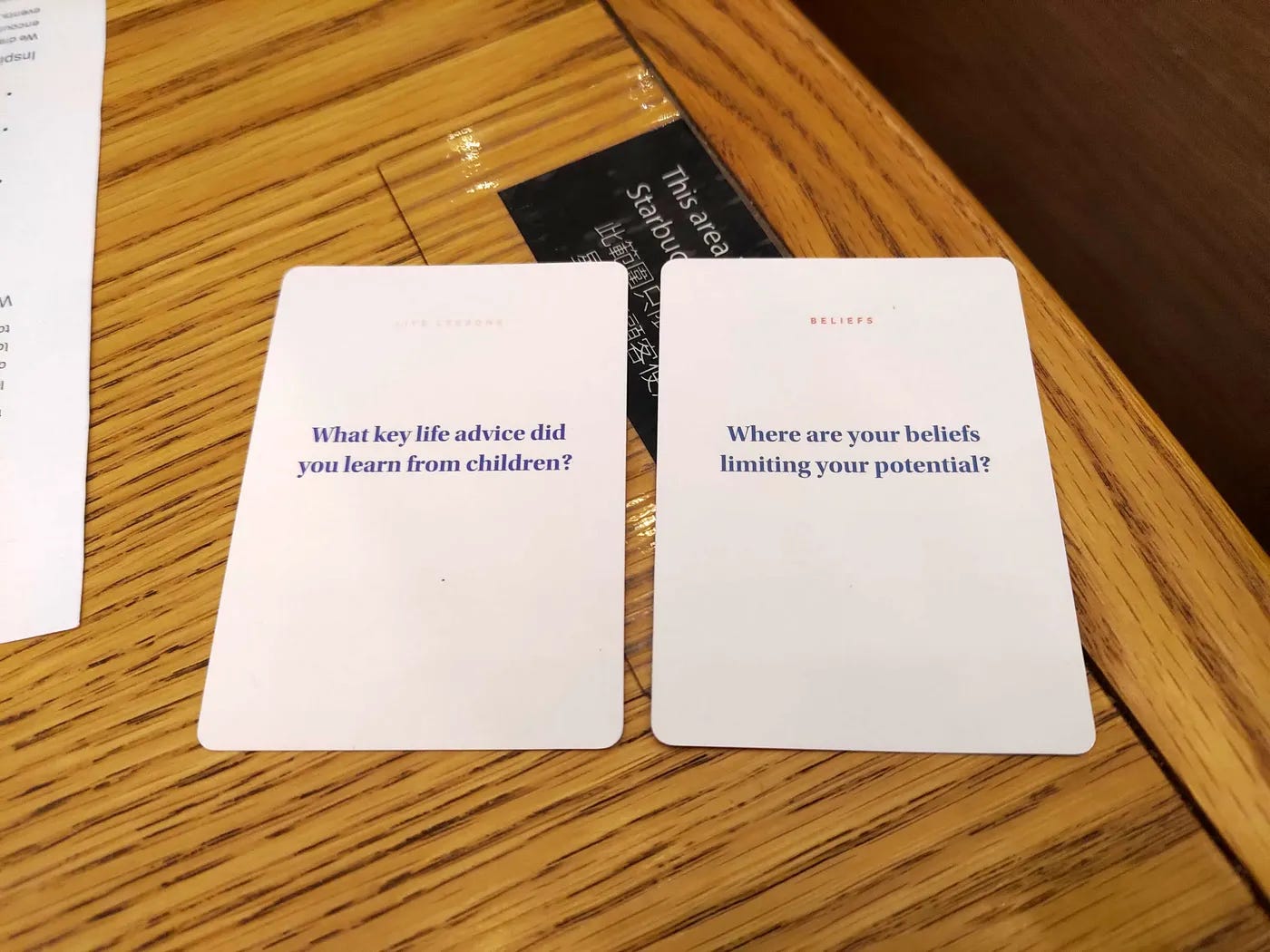Curious Souls Café: Happiness Insights from Our First Gathering in Hong Kong
Hello, Curious Souls! 👋 At our first Curious Souls Café gathering which took place on 26th July 2024, we — Curious Souls in Hong Kong — delved into many profound and thought-provoking questions. Our discussions ranged from key life lessons learned from children to the limitations imposed by our beliefs and the nature of sorrow and happiness:
What key life advice did you learn from children?
Where are your beliefs limiting your potentials?
Why is sorrow more unforgettable than happiness?
Here’s a recap of our enlightening conversation.
Life Lessons from Children
The first part of the session involved using our meaningful icebreaker card deck, starting with a question that prompted us to reflect on the wisdom we can glean from children:
“What key life advice did you learn from children?”
The responses were as diverse as they were insightful:
Bravery and Instinctiveness: Children often act on instinct and show bravery in exploring the world around them.
Energetic Curiosity: Their boundless energy fuels a natural curiosity that drives learning and discovery.
Hunger for Learning: Children have an innate desire to learn and understand, a trait that diminishes as societal norms take hold.
Equality Mindset: Before competitive societal influences shape their views, toddlers naturally see everyone as equals and love unconditionally.
“Embrace the wisdom of children; their simplicity often reveals profound truths.”
Unlike young children, who are raw and have unlimited potential, the myriad belief systems we learn and impose on ourselves complicate life. As suggested by one participant, try to reduce “the noise” from our complex society, as these learned beliefs act as barriers to living a fulfilling life. In other words, embrace spontaneity instead of adhering to rigid plans.
This naturally leads us to our next related question.
Limiting Beliefs
Our next question from the card deck was:
“Where are your beliefs limiting your potentials?”
This prompted a deep dive into personal experiences and reflections on self-imposed limitations.
Sticking to Comfort Zones: One participant shared the struggle of sticking to singing, a comfort zone, rather than pursuing piano playing, which felt less comfortable.
Negative Self-Talk: Another highlighted how self-doubt and negative internal dialogue (like ‘this is not good enough’) can stifle growth.
Complex Belief Systems: Again, the idea that accumulated beliefs from various sources can complicate life, suggesting a need to reduce this “noise” and embrace spontaneity.
Many people continue in their roles until retirement, which can be constraining. As one participant observed, even as certain industries decline, individuals often cling to them due to the security of retirement, hindering their growth. There is so much we don’t know, and staying in our comfort zones causes us to miss valuable opportunities. This idea applies not only to careers but also to marriage. The participant concluded their sharing with a powerful quote:
“A comfort zone is not really comfortable (where you stay because of fear or complacency).”
We also discussed practical approaches to overcoming these limitations:
Growth Mindset: Adopting a mindset similar to that of top athletes who continuously strive to improve by small margins, surpassing their best records, even though they have already achieved countless medals.
Reframing Narratives: Challenging societal norms and personal narratives that limit potential, such as gender roles (e.g., ‘I am a woman’).
Incremental Progress: Inspired by the book Atomic Habits, the idea of breaking down goals into small, manageable steps was emphasized.
“Success is often just a false sense of security.”
The societal definitions of success, such as status and financial security, can be limiting. Instead, as our facilitator reflected, individuals should ideally seek true fulfillment by pursuing their own purpose and excellence, unbound by societal constraints. Failing to do so may lead to regret later in life for not realizing one’s full potential and simply following the crowd.
The Nature of Sorrow and Happiness
We then moved on to the second part of the evening’s discussion, where each participant contributed a question. The one chosen by the group to initiate the discussion was an emotional one:
“Why is sorrow more unforgettable than happiness?”
This sparked a multifaceted discussion:
Rational vs. Irrational Emotions: Sorrow often has an irrational component that keeps it lingering longer than rationality.
Biological Imbalance: The attachment of hormones to emotions can make negative experiences more impactful.
Personal Desires: Unmet desires can program us to dwell on what we lack rather than what we have.
“Happiness is a conscious effort.”
Since recognizing that pain is inevitable, one participant shifted the direction of our discussion to a constructive question: Can we focus not just on unhappiness, but equally on happiness as well?
To address this, we explored ways to balance our focus on both happiness and sorrow:
Gratitude Journals: Keeping a journal to document positive experiences can help counterbalance the emotional weight of sorrow.
Perspective Shift: Be aware of the narratives you tell yourself that are influenced by the external environment. Zooming out and viewing problems in a broader context can diminish their perceived significance.
Mindfulness and Acceptance: Practicing mindfulness and accepting life’s impermanence can reduce the impact of negative emotions. (For more about this idea, refer to the section titled Key Takeaways and Practical Tips below)
“If you practice nothingness every day, the ‘exaggeration’ from the external will lose its effect.”
Despite significant increases in material wealth over the years, many people still experience unhappiness. As our facilitator noted, French sociologist Emile Durkheim’s thought experiment suggests that in a utopia free from pain, individuals would still seek out discomfort, highlighting the notion that life inherently involves suffering, and it would be wiser to be accepting of it — redefine happiness by shifting our focus from what we lack — often emphasized by marketers — to appreciating what we already have and living in the moment.
Key Takeaways and Practical Tips
In the last ten minutes of our event, we entered the final section, “Moment of Truth,” where participants came together to conclude the session with practical advice and profound reflections:
Daily Mindfulness: Taking moments each day to embrace a sense of nothingness (even for a few seconds) can help put life’s challenges into perspective. If we ‘multiply every experience by zero’, the true form of things will reveal themselves. Accept that, in the grand scheme of things, things don’t really matter.
Self-Compassion: Offering ourselves comforting words and recognizing our efforts can foster resilience. For example, as suggested by one participant: “Before you sleep, take at least 30 seconds for reflection to remind yourself that you are the best version of yourself, and that tomorrow, you will become even better.” In the morning, “say hi to a new day, to consciousness.”
Gratitude Practice: Regularly acknowledging what we are grateful for (e.g., through a gratitude journal) can enhance our sense of happiness or well-being.
Living in the Moment: Embracing the present moment and reducing external influences on our internal state can lead to a more balanced life.
One participant used various analogies, such as the one below, to beautifully summarize the session:
“We are both a dangerous and an intelligent machine. And we don’t read the manual on how to operate it. […] There is a manual; we just have to find it.”
Another participant appreciated the discussion, which raised important questions about sorrow, athletes’ growth perspectives, and the discomfort of comfort zones, etc. She reflected on how to frame the potential of things we haven’t yet understood and whether we could have acted differently. Additionally, she emphasized the importance of learning from children and being inspired by their energy and beliefs, encouraging us to live in the moment.
“Life is suffering; we need to learn to deal with sorrow and happiness and how to balance them. Maybe happiness and sorrow eventually ‘multiply by zero’; then why exaggerate them?”
The participant also highlighted the significance of balancing sorrow and happiness, reminding us that exaggerating either emotion is unnecessary, as both are integral to the human experience. After all, perhaps both emotions ultimately “multiply by 0” (we all face an end), so why exaggerate them? Why care too much? When we zoom out, we might realize that this is simply how life is. By acknowledging that we can’t completely eliminate sorrow, we may find that we don’t need happiness as much as we think. Alternatively, we might place too much emphasis on sorrow or harbor an excessive desire for happiness.
As we wrapped up, we were left with the thought that life, with all its ups and downs, is a journey of learning and growth. By challenging our beliefs, practicing mindfulness, and maintaining a curious and open mindset, we can navigate this journey more effectively.
Though this may be uneasy, as we learned from the session about the power of incremental efforts, we can begin by simply planting a seed today.

Join us at the next Curious Souls Café gathering for more deep and meaningful conversations. Together, we can explore the questions that shape our lives and find new ways to grow and thrive.






